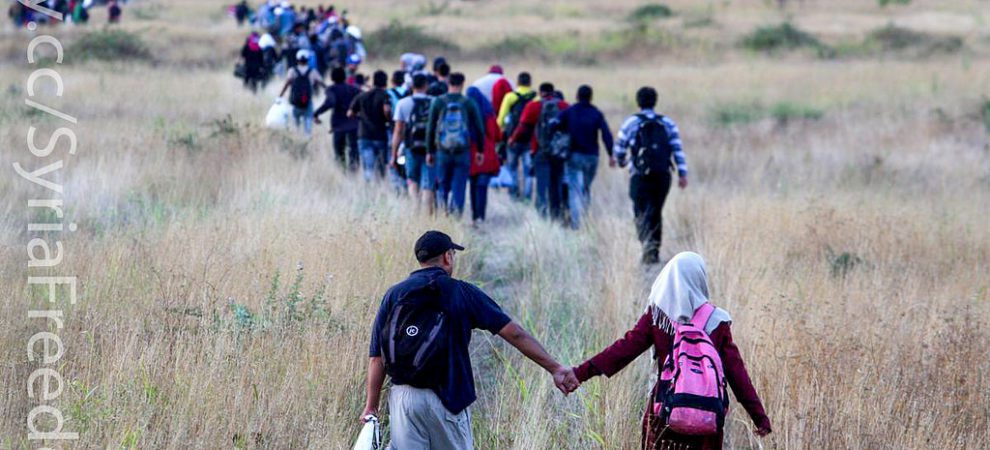
By Sara Veltkamp, Sr. Associate, Minerva Strategies —
Like many people, I’ve ranted and raved this week. Tragedy affects people differently, as does helplessness in the face of tragedy. When I feel helpless, I get angry.
As expected, the vast majority of that anger is directed at the Islamic State, the group that Arabic speakers call Daesh. However, in addition, I also struggled to control the anger I felt, and continue to feel, toward some Americans’ reactions to these tragedies, particularly regarding Syrian refugees. Having lived and worked in Syria for nearly two years just prior to the beginning of the civil war, this subject is near and dear to my heart.
It takes a small amount of logic to understand that Syrians fleeing the violence do not hold the radical ideology of Daesh. Even more infuriating is the belief that Christians should be allowed to be refugees, but not Muslims. Even typing these words, days later, makes me seethe.
However, the over-simplified narrative that some people are using to initiate action against Daesh scares me. I’ll call it the narrative of good versus evil.
We all like stories that pit good against bad, with unblemished heroes rushing in to save the day. I’ve heard numerous calls in the last few days that America needs to be that ‘city on the hill,’ needs to take in the huddled masses, needs to step up and be the hero for Syrians. As a matter of fact, I’ve used this argument, because in the short term it’s effective. If you want people to do something, an appeal to their morality and their goodness often works.
We also want to see Daesh as the heart of darkness, pitted against our virtue. It’s easy to motivate action against evil. Please understand, I believe that Daesh’s ideology and practices are reprehensible. But the problem with labeling them “evil,” is that many people believe that evil cannot be understood and is immutable. Like goodness, evil just is.
Daesh, on the other hand, is a reaction. And reactions can be countered; reactions can be changed.
Stephen Starr, an Irish friend and journalist, and author of the book Revolt in Syria: Eye-Witness to the Uprising, had this to say about the tragedy in Paris on his Facebook wall:
“Looking for answers to events such as Paris 13/11, I think we ignore history at our peril: The Arab world was occupied and brutalized by Europeans back in the 19th and 20th centuries. We put our guys – brutal men – in charge, in the most violent of ways with permission to carry out atrocities on Arab people. So when we ask why and who would carry out events such as Paris, Palmyra, or even Houla, there are two answers: 1) They are often people who spent years or decades being tortured and dehumanized in prisons run by Saddam, Assad x 2 [consecutive Syrian presidents Hafez Al-Assad and his son Bashar Al-Assad], etc. and when set free they’re in no fit state to partake in modern society, or 2) they’re second and third generation Arab immigrants to Europe who don’t feel Arab or European. They see few French or British politicians who look like them on TV or in films, few people to represent them, or to aspire to be like. They have shitty jobs and even shittier prospects, and are thus easy picking for radicals.
So, maybe if we take the time to unwind history a little, we might learn something from all this horror. Maybe then we can understand a bit better.”
The point is not that what Daesh is doing in Syria, Lebanon, Iraq, and around the world is warranted or justified. It is reprehensible and appalling. The point is that it can be understood.
If we are able to understand how it got to be this way and the role history has played, and if we understand what motivates people – often young adults – to join this group and fight on their side, then we can change it. We can institute policies to counteract those motivations like providing affordable education and economic opportunities, welcoming refugees with homes and futures, not just with hugs off the train. We can lobby to more accurately represent Muslim and other minority populations in politics and film. We can change our course of action regarding these countries in international affairs.
This isn’t the easy road and it’s definitely the longest one. If we adopt and use the good versus evil narrative, we merely have to destroy targets with bombs and annihilate Daesh from the face of the earth. We can announce, “mission accomplished” after we’ve released all our firepower. We’re incredibly good at doing that, but history proves it hasn’t been effective in the long term. We’ve followed this policy with the Taliban in Afghanistan, Saddam Hussein in Iraq, and Al-Qaeda in a variety of places. Each time, we have succeeded to kill off particular leaders, but we also created power vacuums that gave Daesh the foothold it needed to grow stronger.
It may be that there is a coordinated military component to reducing the power and effectiveness of Daesh, but that cannot be the only step we take. The more important and challenging step is changing the way we operate so that we can make progress toward a world that is safe for all of us.